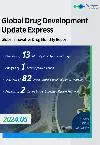MediciNova Announces Positive Results from Secondary Analysis of Phase 2 Trial of MN-166 (ibudilast) Published in The American Journal of Drug and Alcohol Abuse
06 Dec 2022
Phase 2Clinical ResultPhase 3
LA JOLLA, Calif., Dec. 05, 2022 (GLOBE NEWSWIRE) -- MediciNova, Inc., a biopharmaceutical company traded on the NASDAQ Global Market (NASDAQ:MNOV) and the JASDAQ Market of the Tokyo Stock Exchange (Code Number: 4875), today announced that positive results from a secondary analysis of a Phase 2 trial of MN-166 (ibudilast) in alcohol use disorder (AUD) were published in The American Journal of Drug and Alcohol Abuse.
The clinical trial was a collaborative effort between MediciNova and Dr. Lara Ray, Professor, Department of Psychology and Department of Psychiatry and Biobehavioral Sciences, Brain Research Institute at the University of California at Los Angeles (UCLA) and was funded by the National Institute on Drug Abuse (Grant P50 DA005010-33). Topline results from a randomized, double-blind, placebo-controlled Phase 2 trial evaluating the effect of 14 days of ibudilast treatment on mood, heavy drinking, and neural reward signals in 52 non-treatment seeking individuals with AUD found that MN-166 (ibudilast) reduced heavy drinking and attenuated neural cue-reactivity compared to placebo (Grodin et al, Transl Psychiatry, 2021).
Neural and peripheral inflammation has been implicated in the development and maintenance of AUD, as evidenced by increased inflammation in such individuals. A secondary analysis of this study was performed to determine if participants with elevated peripheral levels of proinflammatory proteins, specifically C-reactive protein (CRP), would show a greater benefit from MN-166 (ibudilast) as assessed by clinical (drinks per drinking day, or DPDD; percent heavy drinking days, or PHDD) and biological (cue-elicited neural activation) outcomes.
The publication, entitled, “Baseline C-reactive protein levels are predictive of treatment response to a neuroimmune modulator in individuals with an alcohol use disorder: a preliminary study,” was authored by Dr. Lara Ray and colleagues at UCLA.
Key results reported in the publication are as follows:
Participants with high baseline CRP, i.e., high inflammation, had higher baseline DPDD and PHDD relative to the low baseline CRP group.
No significant differences on DPDD were found between any other groups (p’s >0.17).
The high baseline CRP group treated with placebo had greater alcohol cue-elicited activation in several brain regions relative to the low baseline CRP group treated with placebo (p <0.001).
Kazuko Matsuda, MD, PhD, MPH, Chief Medical Officer of MediciNova, Inc. commented, “We are very pleased that this secondary analysis of the results of this Phase 2 trial in alcohol use disorder have been published. We are thrilled that MN-166 appeared to show great potential clinical utility in individuals with an AUD who also have elevated inflammation, thereby increasing the probability of successful outcomes in the treatment of AUD.”
Professor Lara Ray commented, “Results from this Phase 2 clinical trial reinforce the theory that inflammation plays a role in the effect of MN-166 (ibudilast) treatment on alcohol consumption, implying that individuals with elevated baseline CRP levels benefitted the most from MN-166 (ibudilast) as shown by lower DPDD, PHDD, and lower alcohol cue-elicited activation.”
About Alcohol Use Disorder
Alcohol use disorder (AUD) is a prevalent and disabling psychiatric disorder with limited treatment options. AUD is a chronic relapsing brain disease characterized by compulsive alcohol use, loss of control over alcohol intake, and a negative emotional state when not using alcohol. According to the National Institute on Alcohol Abuse and Alcoholism (NIAAA), an estimated 14.5 million people in the U.S. have AUD and less than 10% receive treatment for the disease. There is a high unmet medical need for better treatments for AUD.
MN-166 (ibudilast) is a small molecule compound that inhibits phosphodiesterase type-4 (PDE4) and inflammatory cytokines, including macrophage migration inhibitory factor (MIF). It is in late-stage clinical development for the treatment of neurodegenerative diseases such as ALS (amyotrophic lateral sclerosis), progressive MS (multiple sclerosis), and DCM (degenerative cervical myelopathy); and is also in development for glioblastoma, CIPN (chemotherapy-induced peripheral neuropathy), and substance use disorder. In addition, MN-166 (ibudilast) was evaluated in patients that are at risk for developing acute respiratory distress syndrome (ARDS).
About MediciNova
MediciNova, Inc. is a clinical-stage biopharmaceutical company developing a broad late-stage pipeline of novel small molecule therapies for inflammatory, fibrotic, and neurodegenerative diseases. Based on two compounds, MN-166 (ibudilast) and MN-001 (tipelukast), with multiple mechanisms of action and strong safety profiles, MediciNova has 11 programs in clinical development. MediciNova’s lead asset, MN-166 (ibudilast), is currently in Phase 3 for amyotrophic lateral sclerosis (ALS) and degenerative cervical myelopathy (DCM) and is Phase 3-ready for progressive multiple sclerosis (MS). MN-166 (ibudilast) is also being evaluated in Phase 2 trials in glioblastoma and substance dependence. MN-001 (tipelukast) was evaluated in a Phase 2 trial in idiopathic pulmonary fibrosis (IPF) and a second Phase 2 trial in non-alcoholic fatty liver disease (NAFLD) is ongoing. MediciNova has a strong track record of securing investigator-sponsored clinical trials funded through government grants.
Organizations
Indications
Drugs
Chat with Hiro
Hot reports
Get started for free today!
Accelerate Strategic R&D decision making with Synapse, PatSnap’s AI-powered Connected Innovation Intelligence Platform Built for Life Sciences Professionals.
Start your data trial now!
Synapse data is also accessible to external entities via APIs or data packages. Leverages most recent intelligence information, enabling fullest potential.





